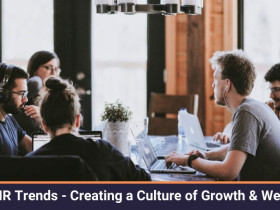In light of digitalization and the advancement of technology, one of the most popular and rising products of those advancements is Artificial Intelligence. It is concerned with computer sciences that encompass a wide range of features and abilities. Artificial Intelligence, or AI for short, is used to build intelligent machines capable of performing tasks that usually require human intelligence. It is characterized by intelligence manufactured at the root level, but learns and grows as the AI is introduced to more and more concepts. Some of the famous technology examples that use AI can be Siri in iOS or Alexa from Amazon.
Artificial Intelligence has brought on a myriad of possibilities in various fields, and the Recruiting Industry has also taken advantage of all the opportunities AI has to offer. According to last year’s report, 56% of HR companies are already using AI for their talent aquisition. It’s predicted that by 2023, 77% of HR organisations will be using AI for their recruitment processes. The future of AI in recruitment looks promising as the tools provided by AI make the recruiting process much easier for the recruiters. It saves a ton of time that can be used resourcefully in other criteria.
One of the main aspects to keep in mind for the recruiting process is the importance of maintaining objectivity. Through a standardized way of shortlisting ideal candidates, the ones who fit the company’s requirements will be prioritized first and cross-checked thoroughly through the AI. Using AI, objectivity and uniformity of the recruitment process will help not only in improving the quality of recruitment, but will also bring out the cream of the crop.

It has predictive analyses that can help determine the success of a candidate in the role they are supposed to occupy when, or if, hired. AI also helps in eliminating the need for resourceful employers to go tediously through several applications, where overlooking specific important details may occur.
It also helps recruiters make data-driven reports and not something based on their subjective perception of whether the candidate ‘felt’ fit for the job. It allows recruiters to avoid frustrating and time-consuming tasks that can be done with more incredible speed with an AI.
Artificial Intelligence recruiting has become a success in several businesses. It is widely popular in the recruitment industry – this appealing tactic can be further understood by knowing the benefits and challenges of using AI in recruitment as detailed below.
The Use of Artificial Intelligence in Recruitment
As mentioned above, Artificial Intelligence has seen exponential growth in its popularity in several industries, including companies and businesses. The recruitment industry is no step behind to catch up. For the HR ecosystem of technology, recruitment through AI is a means of saving time and an assurance of maintaining objectivity and standardizing the process of selecting candidates.
AI-powered tools that assess based on talent intelligence are developed to screen through thousands of applications in much less time than what it would take for recruiters otherwise. According to ismartrecruit, 76% of the hiring managers believe that AI has significant impact in the areas of recruiting.
The biggest challenge in the recruitment process is, more often than not, the very first step – screening candidates’ resumes. Some essential details go unseen, or other times candidates that do not fit the job have outlines that take up too much time to go through.
For companies that receive many applicants especially suffer a loss in terms of human resources efforts. This effort goes ingeniously into menial work that is sometimes not even done right. It is not the mistake of the person responsible for the recruitment when fitting candidates are missed out, or ill-fitting people are hired – as large applicant pools are challenging to go through in in-depth ways. They are not given enough tools to work with when recruiting and often lose their relatively objective mindset as more time is invested in a tiresome task.
Therefore, using Artificial Intelligence helps sustain the resourceful workers while saving time that can be used more beneficially and productively. AI goes through the abilities and resumes of the candidates and determines whether they would be successful at doing the job they would be hired for or not.
Benefits of AI for Recruitment
Several benefits come when encompassing Artificial Intelligence for recruitment. It has brought a new era for the recruitment industry, from which the HR ecosystem and its corresponding technology base benefits a lot:
1. More Time-saving
Time is one of the essential things in any industry, but even more so in the recruitment industry, where manually going through the applications of candidates takes a lot of time out of a resourceful worker’s schedule. The very first screening process needs utmost attention several hours for proper analysis to determine whether a candidate is fit for the job or not.
With the help of AI tools, talent intelligence helps assess the applicant’s skills. This is done within a few seconds, something that would take hours for a person to do. It is designed to go through a large number of data objectivity and quickly single out candidates who will genuinely be resourceful for the company. This is of significant advantage especially during recruiting in campus as it increases the efficiency of HR’s and enhances experience of the candidates
2. Better Integration of Analytics
As AI is designed to cross-check the applications regarding the skill sets required for the job profile, it becomes easier for the hiring managers to analyse their skills and abilities after the screening process is completed.

For in-depth analysis, integrating the data can result in mistakes through the human eyes – but with the help of Artificial Intelligence, this turns into a fast and thorough process where candidates are selected objectively based on their capabilities. It’s not on the whim of a gut feeling that they might be resourceful for the company in the future.
3. Avoids Biased Decisions
It is humanly impossible to restrict your own opinions, thoughts, perceptions, and subjective ideologies that come in the way of making decisions. No matter how small the fraction, there is a personal bias in selecting candidates in the screening process. The first step where applicants are screened requires comprehensive and objective selections, which can only be done through a proper standardized way of going through a large pool of applicants.
Even though Artificial Intelligence is designed to imitate that of human intelligence, what it initially lacks is its schema of thoughts and opinions. This proves to be beneficial in many ways as biased decision of candidate filtering is avoided.
4. Improves Quality of Hiring
Concerning the points mentioned above, in aggregate, it can be assumed that the overall quality of the hiring process is also improved using AI. One of the main components of recruitment is to ensure that the quality is maintained during the recruiting process. This will eminently result in finding candidates that best fit the role required to perform. It also allows the hiring managers to use their resources to assess candidates with suitable quality applications.
According to 2020 Job Seeker Nation Survey, AI helps in delivering a positive candidate experience that has become an expected norm with most of the candidates now.

The most important task – that often becomes too difficult to achieve – is to match the applicant’s skills with the job profile. AI helps in establishing an organized way of the hiring process. AI also ensures that the schedules are created concerning the plans of all people involved
5. Improves Candidate Experience
The use of Artificial Intelligence during recruitment allows the applicants to have an equal chance of being chosen. The candidates are selected solely based on their capabilities. It doesn’t matter if it’s remote candidates, disabled candidates, or temporarily unavailable candidates. The lack of subjectivity that they could be discriminated based on their grounds help candidates enjoy the experience of applying for a job without the fear of rejection.
It also helps ensure that all the candidates are thoroughly looked into and even rediscovered in some cases. This opens the door of equal opportunity for all applicants and makes the recruiting process easier for both the recruiter and the candidate.
Challenges with Implementing AI in Recruitment
After benefits, let’s dive to the challenges, as it is for any phenomenon or object. Artificial Intelligence is no stranger to such challenges – these are drawbacks that can be omitted but more or less will occur at some given point in time. Some avoidable, while some unavoidable, AI comes with its limitations as follows:
1. AI needs a lot of data
For an Artificial Intelligence technology to function, one main component that needs to be developed is intelligence. This development of human-like intelligence requires a lot of data, programming, and framework – and needs to be assessed from time to time to ensure that it stays beneficial for the HR technology ecosystem.

2. AI can learn Human Bias
Like any other being with intelligence, AI can also learn bias if its extensively used. Artificial Intelligence does the initial screening based on data fed into it. If any data is missed out, AI may end up not taking notice of it. Adding to this discussion, AI also adapts to a pattern that may be beneficial for one candidate but disadvantageous for the other
3. AI lacks Human Touch
There are some aspects in the recruitment process of a candidate that only feelings and perceptions of a human mind can fathom. Where the surface level assessment of skills and abilities of an applicant can be screened by the AI, a deeper analysis of their social life, family orientation, moral values, and other such factors cannot be understood by an AI.
This is where the lack of human touch can be seen clearly. There are several other factors that go unnoticed and forgotten by the AI, which otherwise would prove to be beneficial for the company, would they have hired the candidate.
4. AI cannot be entirely reliable for screening candidates
Although the process is standardized and objective, there can be several errors committed in terms of computer science. Where human mistakes exist, AI can either miss out on important aspects or leave out resourceful candidates in the name of equal opportunity and objectivity.
A large applicant pool may be impossible for recruiters to go through thoroughly. AI can help in this, but it solely depends upon the job profile data that is fed into the system.
5. Limited to Candidate Pool that Applies through the System
Although candidate experience is better when recruited through AI, it is quite possible that candidates miss to apply through these systems. Because it is essential to maintain a sense of organized decorum for the AI to screen objectivity and qualitatively, there is a dire need for candidates to apply through the system. This limits the ways an application can be submitted, which can be disadvantageous for both, the candidate who is unable to get an opportunity, and the recruiter who may lose out on a resourceful employee.
Will AI Replace Recruiters?
Nothing can replace humans – and most times, even one human cannot replace the other. Therefore, saying that AI can replace recruiters goes in vain. Undoubtedly, there are many benefits of accommodating Artificial Intelligence in the HR technology ecosystem to make the recruiting process easy. Still, it goes beyond words when it’s said that humans are necessary to make the final decision. In essence, AI is also the work of a human, where a human puts in the data, and the information is later collected by a human.













Certainly, AI in hiring has drastically changed the recruitment paradigm and contributed significantly to hiring top candidates and enhancing the candidate experience.